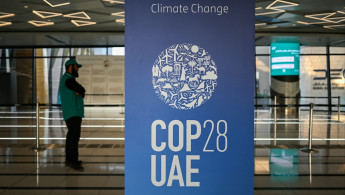What to expect from Dubai's COP28 climate conference
The United Nations Climate Change Conference, COP28, is set to kick off in Dubai, UAE this week, with world leaders due to discuss tougher measures to address growing environmental challenges.
The 28th annual Conference of the Parties runs from 30 November to 12 December. It is anticipated to be the biggest yet, with more than 70,000 attendees expected from governments, civil society, and the private sector.
After a year of record-breaking temperatures and extreme weather events, the summit is happening at a critical juncture with activists urging decisive action by governments to tackle climate change.
Despite the need to urgently tackle the climate emergency, the conference faces several challenges.
What happened during the last COP conference?
Last year’s COP27 conference in Sharm El-Sheikh, Egypt ended on a disappointing note when countries failed to commit to a complete "phasing out" of fossil fuels, opting instead for a pledge to "phase down".
After intense debate at last year's summit and decades of pressure from climate-vulnerable countries, COP27 succeeded in reaching a landmark agreement to establish a Loss and Damage Fund.
The fund is intended to help developing countries, which have historically contributed the least to climate change but are often the most affected by it.
But major questions about the fund, including where the financing will come from and how the fund will be managed, have yet to be determined.
What's at stake?
In September, the UN’s first-ever Global Stocktake report found that the world will not hit the targets needed to avert catastrophic climate impacts.
It warned that the window to take decisive action to keep global warming under the 1.5 degree Celsius threshold set in the landmark 2015 Paris Agreement is "rapidly narrowing".
Meeting the goals requires the "phasing out of all unabated fossil fuels", the report says, but despite this, global emissions continue to rise.
Under current pledges, the world is on track for a 2.5-2.9°C temperature rise above pre-industrial levels by 2100.
What's on the agenda?
The UAE presidency has set four key themes for the summit: energy transition, climate finance, climate resilience, and inclusivity. Two contentious debates - phasing out fossil fuels and a Loss and Damage Fund for poorer nations - are expected to dominate the agenda.
Countries are expected to revise their Nationally Determined Contributions (NDCs) and commit to more ambitious targets for cutting emissions and transitioning towards renewable energy.
This year, there will likely be a push to call for the phasing out of "unabated" fossil fuels, a qualifier understood to refer to emissions that are not captured before being released into the atmosphere.
In addition, there will also be a push to triple global renewable energy capacity by the end of the decade.
Why is it controversial?
The decision to host the conference in the UAE has drawn criticism from climate activists, who point to the Gulf nation’s environmental and human rights record.
The UAE is one of the top 10 oil-producing countries in the world and has faced criticism for not being more vigorous in phasing out fossil fuels.
COP28 is presided over by Sultan Al Jaber, the head of the UAE’s state-owned oil company Adnoc and former head of the country’s renewable energy firm Masdar.
Representatives and lobbyists from the oil and gas industry are likely to have a significant presence at the conference. Last year’s COP27 saw more than 600 fossil fuel delegates in attendance, more than any country delegation.
The UAE presidency has asserted that the industry has an important role to play in the global fight against climate change, a sentiment echoed by the executive secretary of UN Climate Change, Simon Stiell.
"It's important that we recognise that the fossil fuel industry has to be part of the solution," he said.
The New Arab will have continuous coverage of COP28 from Dubai. Click here for more.




 Follow the Middle East's top stories in English at The New Arab on Google News
Follow the Middle East's top stories in English at The New Arab on Google News


![A group of Palestinians, foreign and Israeli activists gather to participated in an olive picking event on the land in the town of Battir, which is under threat of confiscation by Israel in Bethlehem, occupied West Bank on 8 November 2024. [Getty]](/sites/default/files/styles/image_330x185/public/2182930803.jpeg?h=199d8c1f&itok=__0LgGsa)